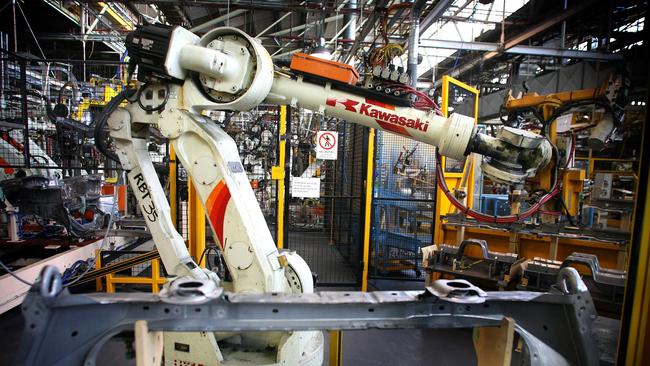How declining productivity weakened our economic immune system

China’s manufacturing PMI fell to a record low of 35.7 in February, from 50 in January, and the non-manufacturing PMI fell even more – from 51.1 to 29.6.
Australia’s major trading partner has come to a standstill so exports to it have too. Wednesday GDP won’t record that, but everyone knows what’s coming when March quarter GDP is published in June – it will be negative. The only question to be answered is whether it will be two quarter negative quarters, and therefore a recession, and it’s hard to see how that can be avoided.
China has become the fulcrum of the global trading system and it’s not just its demand that has collapsed, but its supply as well. Global businesses selling almost any product are running out of stock. And as other countries shut up shop in response to their own coronavirus cases, a global recession becomes more and more inevitable.
On Tuesday the Reserve Bank board meets in the midst of a maelstrom that has come out of nowhere and has changed everything.
They must cut interest rates again, probably by 0.5 per cent.
That’s because what the national accounts will show the following day is that Australia came into this viral black swan in a weak, vulnerable condition. The economy is simply not robust, unable to withstand a shock like this, and we’re not talking about something that might happen in the future – it’s happening now.
Productivity going backwards
The fundamental reason for this vulnerability was revealed two weeks ago in the Productivity Commission’s annual “Insights” publication, which stated that both labour and multifactor productivity fell for the first time since the mining boom, by 0.2 per cent and 0.4 per cent respectively.
It means the sustained declined in productivity growth that’s been going on for 15 years has accelerated, so that we’re not just seeing declining productivity growth, but actual declines.
Declining productivity is a disease that eats at the heart of an economy; almost no matter what else is going on, it’s very difficult for a country to prosper without increasing its productivity. As Paul Krugman said: “Productivity isn’t everything, but, in the long run, it is almost everything. A country’s ability to improve its standard of living over time depends almost entirely on its ability to raise its output per worker.”
In Australia at the moment, output per worker is declining. In a sense, it has weakened our immune system, making the economy more vulnerable to an exogenous shock like the coronavirus.
Slowing tech benefits
Why is this happening? The Productivity Commission has a list of “numerous possible explanations” for the decline in productivity, with the emphasis on possible. They basically add up to: “we don’t know”.
Most of them have to do with technology, for example: “Changes in the nature of technology progress — this encompasses many different theories whose common thread is that new technological breakthroughs are either less likely to occur (due to higher cost or fewer opportunities for improvement) or less likely to yield the benefits that previous discoveries did.”
This is a common idea: that technology this time around is not as big a deal as in previous industrial revolutions.
It’s mainly been promoted by an American economist named Robert Gordon, who wrote a popular book called “The Rise and Fall of American Growth: The US Standard of Living Since the Civil War”.
He wrote: “Invention since 2000 has centred on entertainment and communication devices that are smaller, smarter, and more capable, but do not fundamentally change labour productivity or the standard of living...”
The other big concern about technology that we often read about in books is that artificial intelligence and robots will replace so many jobs that future workers are condemned to mass unemployment, leading to social dislocation and political upheaval. As a result there is a push for a Universal Basic Income to underpin living standards for the armies of non-workers.
Both of these ideas can’t be true, you would think. We can’t have stagnant living standards caused by low productivity growth as well as stagnant living standards caused by mass unemployment. Pick a poison, just one.
Rise of the robots
The idea that recent technological breakthroughs aren’t yielding the benefits of previous discoveries goes against all the evidence of our own eyes.
Factories and mines are now largely devoid of human beings; software, including AI, is making all manner of routine office tasks more efficient; cloud computing is revolutionising the way companies are run; even construction – the last industry to be brought into the 21st century – is now being robotised and AI-ised.
So why is productivity growth so low, and even declining according to the PC’s latest “Insights”?
At the risk of blundering in where economists fear to tiptoe, there are two reasons, in my view:
1. Productivity growth requires demand growth, and after the GFC it slumped and stayed weak. It’s now going to be even weaker.
2. The productivity of robots is not counted because it is not defined as labour, but when a worker is replaced by a robot, he or she does something else that is less productive, which is counted.
There are probably other measurement problems, such as the long lags between the invention of something its spread across industries. It took decades for the 19th century industrial revolution to show up in industrial productivity statistics, economic growth and employment, and before it did, there was misery.
Does it mean the productivity decline is illusory, nothing to worry about? This is not a good time to find out, when we have a pandemic gun pointed at our heads.
Alan Kohler is Editor in Chief of InvestSMART.com.au



It’s hard to imagine a bigger week for the Australian economy: China’s manufacturing index has fallen off a cliff because of the coronavirus, we have the RBA meeting Tuesday and December quarter national accounts on Wednesday.